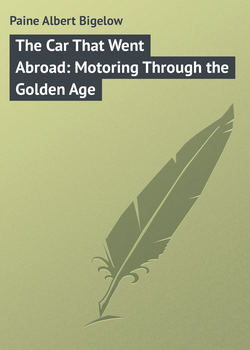Читать книгу The Car That Went Abroad: Motoring Through the Golden Age - Paine Albert Bigelow - Страница 5
Part I
THE CAR THAT WENT ABROAD
Chapter IV
MISTRAL
Оглавление(From my notes, September 10, 1913)
Adjoining our hotel – almost a part of it, in fact, is a remnant of the ancient Roman forum of Arles. Some columns, a piece of the heavy wall, sections of lintel, pediment, and cornice still stand. It is a portion of the Corinthian entrance to what was the superb assembly place of Roman Arles. The square is called Place du Forum, and sometimes now Place Mistral – the latter name because a bronze statue of the "Homer of the Provence" has been erected there, just across from the forum entrance.
Frédéric Mistral, still alive at eighty-three, is the light of the modern Provence.4 We had begun to realize something of this when we saw his photographs and various editions of his poems in the windows of Marseilles and Aix, and handbills announcing the celebration at St. Remy of the fiftieth anniversary of Gounod's score of Mistral's great poem, "Mireille." But we did not at all realize the fullness of the Provençal reverence for "the Master," as they call him, until we reached Arles. To the Provence Mistral is a god – an Apollo – the "central sun from which other Provençal singers are as diverging rays." Whatever Mistral touches is glorified. Provençal women talk with a new grace because Mistral has sung of them. Green slopes and mossy ruins are viewed through the light of Mistral's song. A Mistral anniversary is celebrated like a Declaration of Independence or a Louisiana Purchase. They have even named a wind after him. Or perhaps he was named after the wind. Whichever way it was, the wind has taken second place and the people smile tenderly now, remembering the Master, when its name is mentioned.
I believe Mistral does not sing in these later days. He does not need to. The songs he sang in youth go on singing for him, and are always young. Outside of France they are not widely known; their bloom and fragrance shrink under translation. George Meredith, writing to Janet Ross in 1861, said: "Mistral I have read. He is really a fine poet." But to Meredith the euphonies of France were not strange.
And Mistral has loved the Provence. Not only has he sung of it, but he has given his labor and substance to preserve its memories. When the Academy voted him an award of three thousand francs he devoted it to the needs of his fellow poets;5 when he was awarded the Nobel prize he forgot that he might spend it on himself, and bought and restored an old palace, and converted it into a museum for Arles. Then he devoted his time and energies to collecting Provençal relics, and to-day, with its treasures and associations, the place has become a shrine. Everything relating to the life and traditions of the Provence is there – Roman sculpture, sarcophagi, ceramics, frescoes, furnishings, implements – the place is crowded with precious things. Lately a room of honor has been devoted to the poet himself. In it are cases filled with his personal treasures; the walls are hung with illustrations used in his books. On the mantel is a fine bust of the poet, and in a handsome reliquary one finds a lock of hair, a little dress, and the cradle of the infant Mistral. In the cradle lies the manuscript of Mistral's first and greatest work, the "Mireille." The Provence has produced other noted men – among them Alphonse Daudet, who was born just over at Nîmes, and celebrated the town of Tarascon with his Tartarin. But Daudet went to Paris, which is, perhaps, a sin. The Provence is proud of Daudet, and he, too, has a statue, at Nîmes; but the Provence worships Mistral.
4
Written in 1913. Mistral died March 24th of the following year.
5
Daudet in his Lettres de Mon Moulin says:
